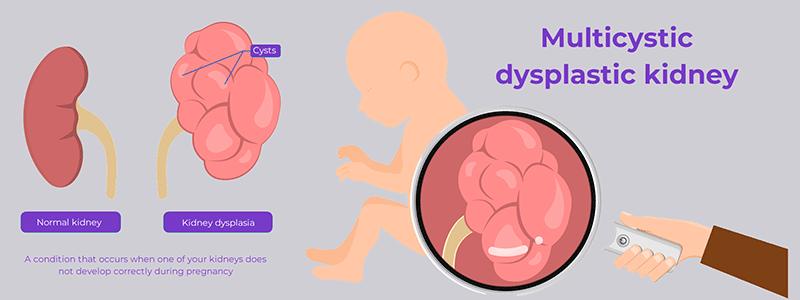Multicystic dysplastic kidney (mul·ti·cys·tic - dys·pla·sia - kid·ney) or MCDK occurs when one of the kidneys does not develop properly while in the womb, and has many cysts (fluid-filled sacs) and scar tissue.
Overview
What is a multicystic dysplastic kidney in children (MCDK)?
Multicystic dysplastic kidney is a common disorder in which one kidney doesn’t properly form during fetal development.
The kidneys begin to develop in the first trimester of pregnancy and, if something goes wrong, the fetus can end up with one non-functioning kidney that is full of cysts and scar tissue.
In most cases, the other healthy kidney can successfully take over the functions of the non-functioning kidney, such as removing waste from the blood and creating urine.

Signs and Symptoms
What are the signs and symptoms of a multicystic dysplastic kidney in children (MCDK)?
Cysts
Scar tissue
Diagnosis
How is multicystic dysplastic kidney in children (MCDK) diagnoised?
Many children are diagnoised before birth during a prenatal ultrasound.
Doctors and Providers
 Jyothsna GattineniPediatric Nephrologist
Jyothsna GattineniPediatric Nephrologist Craig Andrew PetersPediatric Urologist
Craig Andrew PetersPediatric Urologist Mouin Gerios SeikalyPediatric Nephrologist
Mouin Gerios SeikalyPediatric Nephrologist Elizabeth J BrownPediatric Nephrologist
Elizabeth J BrownPediatric Nephrologist Alexandra Maria Ciota CarolanPediatric Urologist
Alexandra Maria Ciota CarolanPediatric Urologist Keri A DrakePediatric Nephrologist
Keri A DrakePediatric Nephrologist David Harris EwaltPediatric Urologist
David Harris EwaltPediatric Urologist Micah A JacobsPediatric Urologist
Micah A JacobsPediatric Urologist Halima Saadia JanjuaPediatric Nephrologist
Halima Saadia JanjuaPediatric Nephrologist Raymond Phillip QuigleyPediatric Nephrologist
Raymond Phillip QuigleyPediatric Nephrologist Bruce Jeremy SchlomerPediatric Urologist
Bruce Jeremy SchlomerPediatric Urologist Irina StanaselPediatric Urologist
Irina StanaselPediatric Urologist Smitha Rao VidiPediatric Nephrologist
Smitha Rao VidiPediatric Nephrologist Robin Leigh LandgrafNurse Practitioner - Wound Ostomy
Robin Leigh LandgrafNurse Practitioner - Wound Ostomy